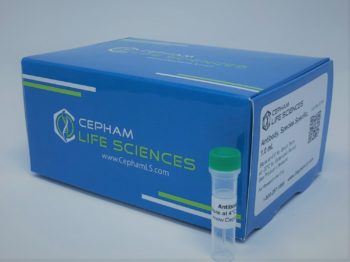Description
Aliases
F-ATPase delta subunit, ATP5D
Antibody Type
Polyclonal Antibody
Species
Human
Uniprot ID
P30049
Immunogen
Recombinant human ATP synthase subunit delta, mitochondrial protein (23-168AA)
Raised In
Rabbit
Species Reactivity
Human
Tested Applications
ELISA;Not yet tested in other applications.
Background / Function
Mitochondrial membrane ATP synthase (F1F0 ATP synthase or Complex V) produces ATP from ADP in the presence of a proton gradient across the membrane which is generated by electron transport complexes of the respiratory chain. F-type ATPases consist of two structural domains, F1 – containing the extramembraneous catalytic core, and F0 – containing the membrane proton channel, linked together by a central stalk and a peripheral stalk. During catalysis, ATP turnover in the catalytic domain of F1 is coupled via a rotary mechanism of the central stalk subunits to proton translocation. Part of the complex F1 domain and of the central stalk which is part of the complex rotary element. Rotation of the central stalk against the surrounding alpha3beta3 subunits leads to hydrolysis of ATP in three separate catalytic sites on the beta subunits.
Isotype
IgG
Conjugate
FITC
Storage Buffer
Preservative: 0.03% Proclin 300
Constituents: 50% Glycerol, 0.01M PBS, PH 7.4
Form
Liquid
Storage
Shipped at 4°C. Upon delivery aliquot and store at -20°C or -80°C. Avoid repeated freeze.
Purity
Caprylic Acid Ammonium Sulfate Precipitation purified
Modification
ATP synthase subunit delta, mitochondrial
Literature
[1]”Initial characterization of the human central proteome.” Burkard T.R., Planyavsky M., Kaupe I., Breitwieser F.P., Buerckstuemmer T., Bennett K.L., Superti-Furga G., Colinge J. BMC Syst. Biol. 5:17-17(2011). [2]”Human liver protein map: a reference database established by microsequencing and gel comparison.” Hochstrasser D.F., Frutiger S., Paquet N., Bairoch A., Ravier F., Pasquali C., Sanchez J.-C., Tissot J.-D., Bjellqvist B., Vargas R., Appel R.D., Hughes G.J. Electrophoresis 13:992-1001(1992). [3]”The status, quality, and expansion of the NIH full-length cDNA project: the Mammalian Gene Collection (MGC).” The MGC Project Team Genome Res. 14:2121-2127(2004).Additional information
| Size | 50μg, 100μg |
|---|


